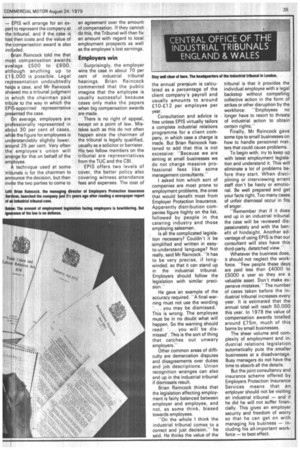CENTRAL OFFICE OF THE INDUSTRIAL TRIBUNALS ENGLAND & WALES
Page 37

If you've noticed an error in this article please click here to report it so we can fix it.
the annual premium is calculated as a percentage of the client company's payroll and usually amounts to around £10-£12 per employee per year.
Consultation and advice is free unless EPIS virtually tailors a complete industrial relations programme for a client com pany, in which case a charge is made. But Brian Raincock hastened to add that this is not excessive: "Because we are aiming at small businesses we do not charge massive professional fees like some management consultants."
I asked him which sort of companies are most prone to employment problems, the ones that would benefit most from Employer Protection Insurance. Apparently distribution companies figure highly on the list, followed by people in the catering industry and those employing salesmen.
Is all the complicated legislation necessary? Couldn't it be simplified and written in easyto-understand language? Not really, said Mr Raincock. "It has to be very precise, if longwinded, so that it can stand up in the industrial tribunal. Employers should follow the legislation with similar precision."
He gave an example of the accuracy required. "A final warning must not use the wording ". . . you may be dismissed.' This is wrong. The employee must be in no doubt what will happen. So the warning should
read: ". . you will be dismissed'. This is the sort of thing that catches out unwary employers."
Other common areas of difficulty are demarcation disputes and disagreements over duties and job descriptions. Union recognition wranges can also end up in the industrial tribunal if dismissals result.
Brian Raincock thinks that the legislation affecting employment is fairly balanced between employer and employee, and not, as some think, biased towards employees.
"On the whole I think the industrial tribunal comes to a correct and just decision," he said. He thinks the value of the tribunal is that it provides the individual employee with a legal backstop without compelling collective action in the form of strikes or other disruption by the workforce: "Employees no longer have to resort to threats of industrial action to obtain certain rights."'
Finally, Mr Raincock gave some tips to small businesses on how to handle personnel matters that could cause problems.
To begin with, try to keep up with latest employment legislation and understand it. This will eliminate a lot of problems before they start. When disciplining or interviewing errant staff don't be hasty or emotional. Be well prepared and get your facts right. Too many cases of unfair dismissal occur in fits of anger.
"Remember that if it does end up in an industrial tribunal the case will be reviewed dispassionately and with the benefit of hindsight. Another advantage of using EPIS is that our consultant will also have this third-party, detatched view.'" Whatever the business does, it should not neglect the workforce. "Few people these days are paid less than £4000 to £5000 a year so they are a valuable asset. Don't make expensive mistakes." The number of cases taken before the industrial tribunal increases every year. It is estimated that the annual total will reach 50,000 this year. In 1978 the value of compensation awards totalled around £75m, much of this borne by small businesses.
The sheer volume and complexity of employment and industrial relations legislation automatically puts the •smaller businesses at a disadvantage. Busy managers do not have the time to absorb all the details.
But the joint consultancy and insurance scheme offered by Employers Protection Insurance Services means that an employer should not be visiting an industrial tribunal — and if he did he will not suffer financially. This gives an employer security and freedom of worry so that he can get on with managing his business — including his all-important workforce — to best effect.








































































































